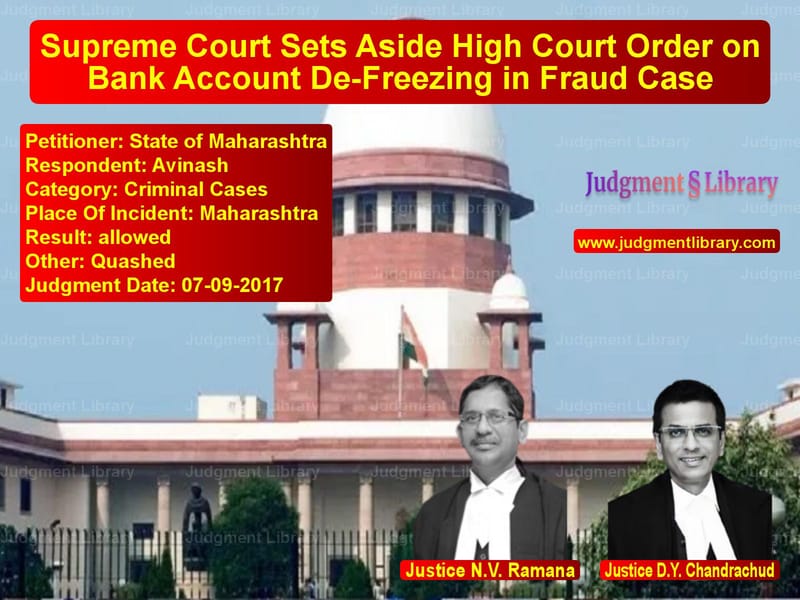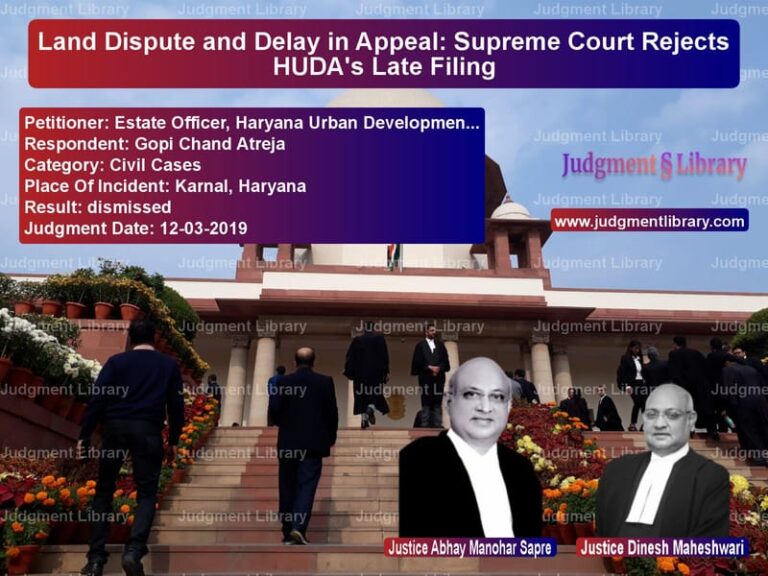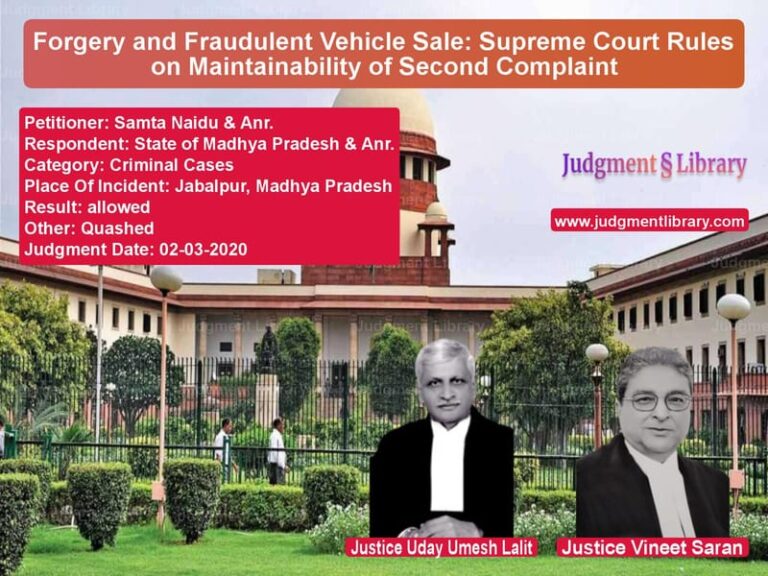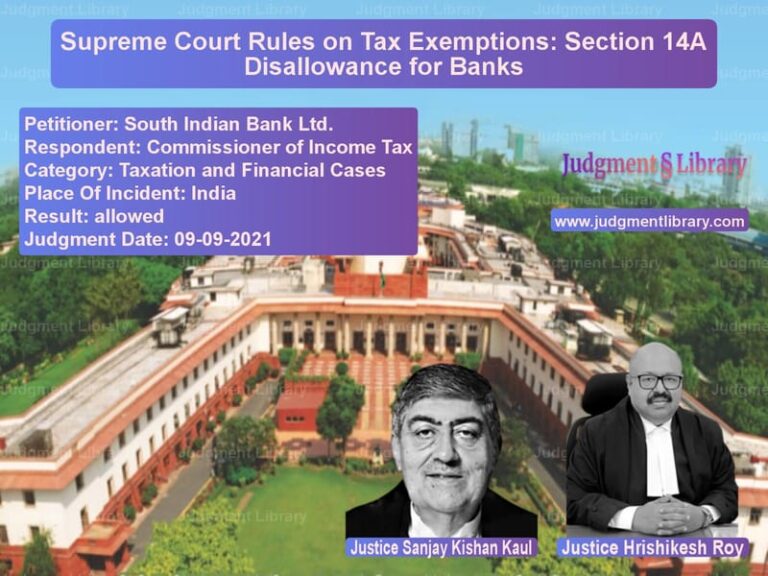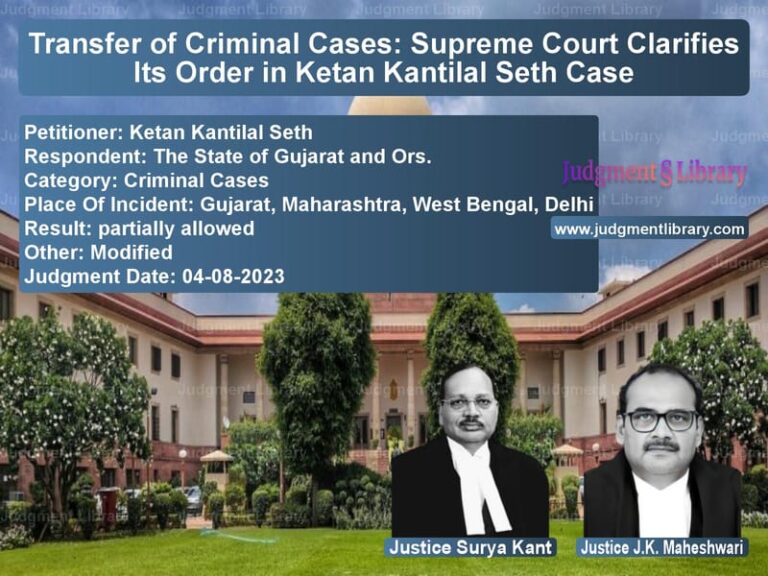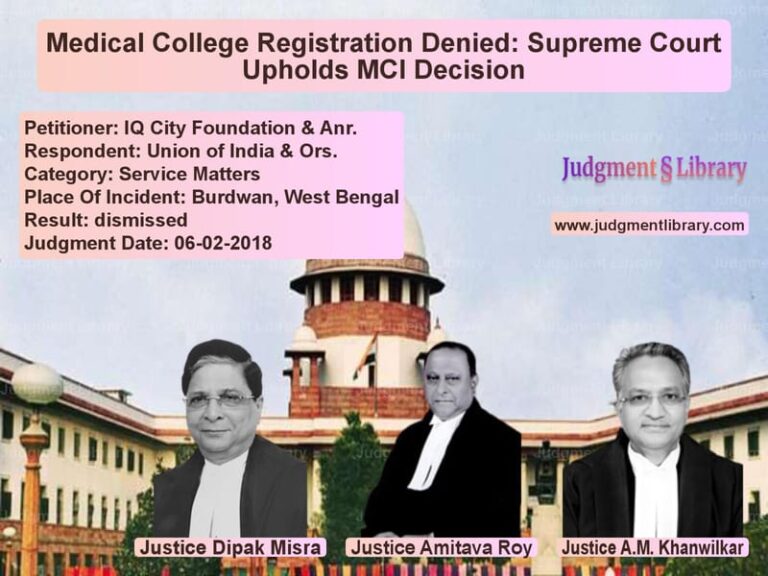Supreme Court Sets Aside High Court Order on Bank Account De-Freezing in Fraud Case
The case of State of Maharashtra vs. Avinash revolves around an alleged financial fraud where the respondent was accused of defrauding investors through a company named Wasankar Wealth Management Ltd. The Supreme Court was called upon to decide whether the Bombay High Court was correct in directing the de-freezing of the respondent’s bank accounts despite pending criminal proceedings under the Maharashtra Protection of Interest of Depositors (In Financial Establishments) Act, 1999 (MPID Act).
Background of the Case
A First Information Report (FIR) was lodged on May 9, 2014 against the directors of Wasankar Wealth Management Ltd. The complainant, Vivek Pathak, alleged that he was fraudulently induced to invest Rs. 2.74 crores. The case was registered under Sections 420 (Cheating), 406 (Criminal Breach of Trust), 506 (Criminal Intimidation), and 120-B (Criminal Conspiracy) of the Indian Penal Code, as well as under Section 3 of the MPID Act.
During the investigation, the respondent’s bank accounts were frozen by the authorities to prevent dissipation of funds. The Special Judge under the MPID Act later granted him bail with stringent conditions, including an undertaking to deposit Rs. 1.5 crores every month.
Legal Issues
The Supreme Court examined the following key legal issues:
- Whether the Bombay High Court erred in ordering the de-freezing of the respondent’s bank accounts while the investigation was ongoing.
- Whether the respondent’s repeated attempts to seek relief from different courts constituted an abuse of process.
- The applicability of the MPID Act, which provides for a special procedure for dealing with financial fraud affecting investors.
Arguments by the Petitioner (State of Maharashtra)
The State of Maharashtra, represented by its counsel, contended:
- The respondent’s assets, including bank accounts, were frozen to safeguard investor funds and prevent misappropriation.
- The respondent had previously approached the Bombay High Court for the same relief but had withdrawn his plea, only to file a fresh application before a Single Judge.
- The High Court failed to appreciate that the MPID Act overrides the general provisions of the Criminal Procedure Code (CrPC) in financial fraud cases.
- The respondent’s release on bail was conditional upon monthly payments, and de-freezing his accounts would undermine the purpose of the bail order.
Arguments by the Respondent (Avinash)
The respondent, through his counsel, argued:
- His bank accounts were illegally frozen under Section 102 of the CrPC, which does not apply when a special law like the MPID Act is in force.
- Since he was cooperating with the investigation and had been granted bail, there was no justification for freezing his accounts.
- He was willing to offer immovable property as security in lieu of the frozen funds.
Supreme Court Judgment
The Supreme Court ruled in favor of the State of Maharashtra, setting aside the Bombay High Court’s order. The key findings of the Court were:
- The respondent had abused the judicial process by filing multiple applications seeking the same relief.
- The MPID Act provides a special mechanism for dealing with investor fraud, and the High Court failed to consider its overriding effect.
- The freezing of bank accounts was justified to protect investors’ interests and prevent further financial misappropriation.
Observations of the Supreme Court
The Court made strong remarks on judicial propriety and the need to prevent misuse of legal processes:
“The respondent had sought and withdrawn a similar plea before the Division Bench of the High Court. It was an abuse of process to subsequently approach a Single Judge seeking the same relief.”
The Court further held:
“The MPID Act has overriding effect over the CrPC in matters of financial fraud affecting investors. The High Court erred in ignoring this crucial aspect.”
Significance of the Ruling
This judgment clarifies several crucial legal principles:
- The importance of judicial discipline in preventing forum shopping.
- The primacy of the MPID Act over general criminal laws in cases involving financial fraud.
- The need to preserve investor interests by restricting access to potentially misappropriated funds.
Conclusion
The Supreme Court’s ruling in State of Maharashtra vs. Avinash reinforces the integrity of the judicial process while upholding investor protection laws. By setting aside the High Court’s order, the Court has reaffirmed the principle that financial fraud cases require strict enforcement of legal safeguards. This decision ensures that accused individuals cannot misuse legal loopholes to evade accountability while investors’ interests remain protected.
Don’t miss out on the full details! Download the complete judgment in PDF format below and gain valuable insights instantly!
Download Judgment: State of Maharashtra vs Avinash Supreme Court of India Judgment Dated 07-09-2017.pdf
Direct Downlaod Judgment: Direct downlaod this Judgment
See all petitions in Money Laundering Cases
See all petitions in Fraud and Forgery
See all petitions in Bail and Anticipatory Bail
See all petitions in Judgment by N.V. Ramana
See all petitions in Judgment by Dhananjaya Y Chandrachud
See all petitions in allowed
See all petitions in Quashed
See all petitions in supreme court of India judgments September 2017
See all petitions in 2017 judgments
See all posts in Criminal Cases Category
See all allowed petitions in Criminal Cases Category
See all Dismissed petitions in Criminal Cases Category
See all partially allowed petitions in Criminal Cases Category

